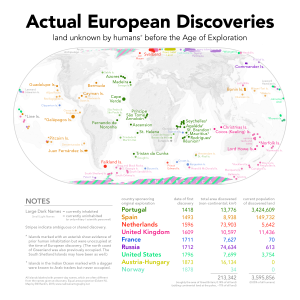Introduction
The story of Pacific and Australian exploration by Europeans is a story of interpersonal and cross-cultural encounters. As European technology changed, and European explorers set out to discover the world, they found they were not the first people to discover the islands of the Pacific or the Australian continent. The places the explorers came to already had a human past, and the explorers’ own histories meant they arrived with pre-conceived ideas of what they would find. This meeting of cultures has left fascinating records, in the form of the journals and maps created by European explorers. The European discovery of an already discovered region is a curious history of encounter, misconception, conflict, adjustment, and engagement.
While explorers might seem readily identifiable, the terms ‘explorer’ and ‘exploration’ are difficult to define. Since the 1980s, historians have interrogated the ways in which the terms are applied, and their analyses recognise the links between exploration, empire building, publication and self-promotion, collection of samples and specimens, and ties to significant institutions within the explorers’ home countries. The situation is further complicated by the term only gaining its current sense in the Victorian period, and by the blurriness of the distinction between exploration and travel. Explorers tended to be leaders of their expeditions, and to publish accounts of their travels, but these elements were not universal. However, all explorers were connected in some way to their home communities, either by being forerunners of settlement or colonisation, or representatives of the state, or connected to significant institutions, or authors of widely read books. Travellers might have similar connections, but explorers could distinguish themselves by deliberately facing danger, or at least undergoing physical suffering during their expeditions.
Most explorers cemented their status by publishing accounts of their expeditions, leaving us intriguing documents. When we read the journals written by the explorers and when we examine the maps constructed from the information they collected on their travels, we peer at the past through distorted lenses. We can glimpse Indigenous societies and individuals during the period of contact (and then during the period of growing familiarity with Europeans), and we can also catch glimpses of the documents’ authors. European records of island societies can offer windows on Pacific pasts, offering observers in the present a view of Pasifika ancestors and their achievements. The records of exploration also offer us views of the explorers’ own societies, and their expectations of the world based on their previous experiences, hopes, and fears. The journals and maps are both windows and mirrors: they contain observations of the world beyond Europe, and they reflect European preconceptions and European systems of thought.

The experiences, perceptions, and records created by European explorers during their voyages within the Pacific linked Europe and the Pacific together in many ways. The Pacific became an element of European cultural history as Europeans used their Pacific experiences to think with, and to examine their own societies. The Pacific found a place in the history of science as it became a space where significant observations were made. And the Pacific and Australia became places where Europeans established empires and settler colonies. European explorers self-consciously identified resources and potential sites for colonies, and as a result the peoples of the Pacific and the Australian continent experienced histories of colonisation.
The relationship between exploration and colonisation is complex. The Indigenous peoples of Australia and the Pacific responded to the opportunities provided by European explorers, at times reshaping their own societies. Islanders in particular responded innovatively to the availability of the European goods that explorers traded for food, profoundly changing island economies to take advantage of newly available technologies. In some places leaders and politicians exploited preferential access to the new goods (particularly European weapons) to alter the local balance of power. In many places across the Pacific, Christian missionaries were welcomed, first for the literacy they promoted, and then for the religion they brought. And Indigenous people throughout Australia and the Pacific quickly began to use European vessels to tap into new opportunities for travel and for paid labour.
The establishment of the Port Jackson colony (now Sydney) marked an important shift in the European presence in the Pacific, and the beginning of settler colonialism in the region. The relationship between exploration and colonisation in Australia was generally reversed, and European settlement frequently preceded European exploration: the first colony was founded before the outline of the continent was known. Across the Pacific, European empires claimed island groups as their own, a process that had started at first contact although it was some time before those initial claims could be enforced. Like the Australian continent, Aotearoa (New Zealand) and Hawai’i experienced settler colonialism; other islands were drawn into empires and experienced other forms of European colonial influence and control.
The links between politics, exploration, and colonisation are yet to be fully resolved. The large-scale exploration of the Pacific was conducted by representatives of European governments: that political element influenced the agendas of explorers, and limited who was able to be an explorer. European expeditions of exploration were almost exclusively the preserve of white men, something that becomes most obvious when looking at the role of other groups, and the difficulties they faced in being recognised as explorers. More recently, a growing awareness of the injustices of empire and a quest for social justice and reconciliation has extended the story of Australian and Pacific exploration to recognise the groups of people who actually discovered these regions of the world and who already knew and cared for them when Europeans were only just learning they existed.

